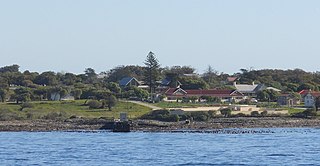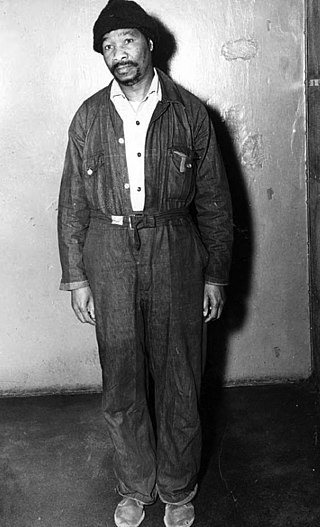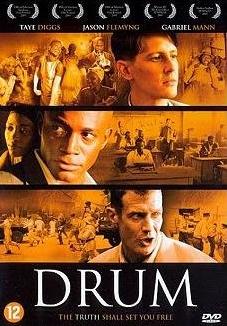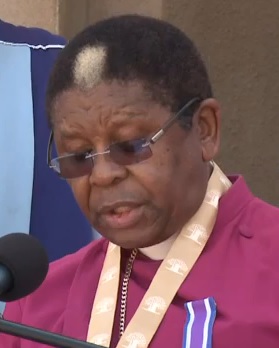Related Research Articles

Robben Island is an island in Table Bay, 6.9 kilometres (4.3 mi) west of the coast of Bloubergstrand, north of Cape Town, South Africa. It takes its name from the Dutch word for seals (robben), hence the Dutch/Afrikaans name Robbeneiland, which translates to Seal(s) Island.

Walter Max Ulyate Sisulu was a South African anti-apartheid activist and member of the African National Congress (ANC). Between terms as ANC Secretary-General (1949–1954) and ANC Deputy President (1991–1994), he was incarcerated on Robben Island, where he served more than 25 years' imprisonment for his activism. He had a close partnership with Oliver Tambo and Nelson Mandela, with whom he played a key role in organising the 1952 Defiance Campaign and the establishment of the ANC Youth League and Umkhonto we Sizwe. He was also on the Central Committee of the South African Communist Party.

Govan Archibald Mvuyelwa Mbeki was a South African politician, military commander, Communist leader who served as the Secretary of Umkhonto we Sizwe, at its inception in 1961. He was also the son of Chief Sikelewu Mbeki and Johanna Mahala and also the father of the former South African president Thabo Mbeki and political economist Moeletsi Mbeki. He was a leader of the South African Communist Party and the African National Congress. After the Rivonia Trial, he was imprisoned (1963–1987) on charges of terrorism and treason, together with Nelson Mandela, Walter Sisulu, Raymond Mhlaba, Ahmed Kathrada and other eminent ANC leaders, for their role in the ANC's armed wing, Umkhonto we Sizwe (MK). He was sometimes mentioned by his nickname "Oom Gov".
Raymond Mphakamisi Mhlaba was an anti-apartheid activist, Communist and leader of the African National Congress (ANC) also as well the first premier of the Eastern Cape. Mhlaba spent 25 years of his life in prison. Well known for being sentenced, along with Nelson Mandela, Govan Mbeki, Walter Sisulu and others in the Rivonia Trial, he was an active member of the ANC and the South African Communist Party (SACP) all his adult life. His kindly manner brought him the nickname "Oom Ray".

Ahmed Mohamed Kathrada, sometimes known by the nickname "Kathy", was a South African politician and anti-apartheid activist.
Events from the year 1962 in South Africa. This year is notable for its internal and international resistance campaigns against the country's Apartheid legislation. Umkhonto we Sizwe, the militant wing of the African National Congress, made its first sabotage attacks in 1961, and Nelson Mandela traveled to Ethiopia to rally support for Umkhonto and justify the attacks. Nelson Mandela was sentenced to jail for 5 years upon returning to South Africa for illegally leaving the country. The international sporting community also showed its displeasure with the government's laws. FIFA suspended South Africa in 1962 for fielding an exclusively-white South African national football team, forcing South African football authorities to add black players to the team. The government, in turn strengthened methods of enforcing Apartheid, and the Robben Island prison was made a political prison in 1962.

Ngungunyane, also known as Mdungazwe Ngungunyane Nxumalo, N'gungunhana, or Gungunhana Reinaldo Frederico Gungunhana, was a tribal king and vassal of the Portuguese Empire, who rebelled, was defeated by General Joaquim Mouzinho de Albuquerque and lived out the rest of his life in exile, first in Lisbon, but later on the island of Terceira, in the Azores.

Drum is a 2004 film based on the life of South African investigative journalist Henry Nxumalo, who worked for Drum magazine, called "the first black lifestyle magazine in Africa". It was director Zola Maseko's first film and deals with the issues of apartheid and the forced removal of residents from Sophiatown. The film was originally to be a six-part television series called Sophiatown Short Stories, but Maseko could not get the funding. The lead roles of Henry Nxumalo and Drum main photographer Jürgen Schadeberg were played by American actors Taye Diggs and Gabriel Mann, while most of the rest of the cast were South African actors.

Njongonkulu Winston Hugh Ndungane is a retired South African Anglican bishop and a former prisoner on Robben Island. He was the Bishop of Kimberley and Kuruman and Archbishop of Cape Town.
Inkamana High School is in Vryheid, Kwazulu Natal, South Africa. It was started in 1923 and had 200 boarding students in 2009.
Henry Nxumalo, also known as Henry "Mr Drum" Nxumalo, was a pioneering South African investigative journalist under apartheid.
Jürgen Schadeberg was a German-born South African photographer and artist. He photographed key moments in South African history, including iconic photographs such as Nelson Mandela at Robben Island prison. He also lived, worked and taught in London and Spain, and photographed in many African countries.
The South African Youth Revolutionary Council (SAYRCO) was a South African political organisation. SAYRCO profiled itself as a 'third force' in the anti-Apartheid struggle. It was associated with the Black Consciousness Movement.

The Groote Kerk is a Dutch Reformed church in Cape Town, South Africa. The church is South Africa's oldest place of Christian worship, built by Herman Schuette in 1841. The first church on this land was built in 1678. Willem Adriaan van der Stel laid the cornerstone for the church. It was replaced by the present building in 1841, but the original tower was retained. The pulpit is the work of Anton Anreith and the carpenter Jacob Graaff, and was inaugurated on 29 November 1789. The Groote Kerk lays claim to housing South Africa's largest organ, which was installed in 1954 and has 5917 pipes.
The 1620 Robben island earthquake is widely accepted as the oldest recorded earthquake in South African history. It reportedly occurred on April 7, 1620 off Robben Island, with a Mercalli intensity of II – IV (Weak–Light). The event was observed by Augustin de Beaulieu, who was leading a fleet of three ships on Table Bay at the time, who recorded "two startling thunderclaps like cannon shots while ship was becalmed near Robben Island" between 6:00 and 7:00.

Maximum Security Prison is an inactive prison at Robben Island in Table Bay, 6.9 kilometers (4.3 mi) west of the coast of Bloubergstrand, Cape Town, South Africa. It is prominent because Nobel Laureate and former President of South Africa Nelson Mandela was imprisoned there for 18 of the 27 years he served behind bars before the fall of apartheid. After that, three former inmates of this prison Nelson Mandela, Kgalema Motlanthe, and Jacob Zuma have gone on to become President of South Africa.
The Robben Island Marine Protected Area is an inshore and offshore conservation region around and near Robben Island in Table Bay in the territorial waters of South Africa.
Nxumalo is a surname. Notable people with the surname include:
Sonny Venkatrathnam was a South African anti-apartheid activist and human rights activist who was imprisoned in the Robben Island Maximum Security Prison along with other anti-apartheid activists including Nelson Mandela, Govan Mbeki, and Mac Maharaj. He was most famously known for smuggling an edition of The Complete Works of William Shakespeare into the prison. The book was shared with many of the high-profile prisoners in the prison and was called the Robben Island Bible.

Ebrahim Ismail Ebrahim was a South African anti-apartheid activist of Indian origin who was a member of the African National Congress's armed wing uMkhonto we Sizwe. He was tried in the Pietermaritzburg sabotage trials of 1963 and was sentenced to a 15-year imprisonment at the Robben Island Maximum Security Prison.